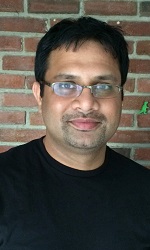 Yvonne Chen, PhD Associate Professor Department of Microbiololgy, Immunology, and Molecular Genetics Uuniversity of California, Los Angeles | Keynote
Dr. Yvonne Chen is an Associate Professor of Microbiology, Immunology, and Molecular Genetics at the University of California, Los Angeles. She is also a faculty, by courtesy, in the Department of Chemical and Biomolecular Engineering. Yvonne received her B.S. in Chemical Engineering from Stanford University and her Ph.D. in Chemical Engineering from the California Institute of Technology. She received postdoctoral training at the Seattle Children’s Research Institute and the Department of Systems Biology at Harvard Medical School. Prior to joining UCLA in 2013, Yvonne was a Junior Fellow in the Harvard Society of Fellows. The Chen Laboratory focuses on applying synthetic biology and biomolecular engineering techniques to the development of novel mammalian-cell systems. The Chen Lab’s work on engineering next-generation T-cell therapies for cancer has been recognized by the NIH Director’s Early Independence Award, the NSF CAREER Award, the Hellman Fellowship, the ACGT Young Investigator Award in Cell and Gene Therapy for Cancer, the Mark Foundation Emerging Leader Award, and the Cancer Research Institute Lloyd J. Old STAR Award. |
 Alexander Cheung, PhD Chief Scientific Officer Immulus, Inc.
|
Alexander Cheung is the CSO of Immulus, Inc. Immulus builds bioinstructive materials to program immune cell functions. Alex is a biomedical engineer with expertise in materials science and T cell therapy manufacturing. Alex earned his Ph.D. from Harvard University where he developed biomaterial platforms for immuno-oncology applications. He has experience in downstream process development for T cell drug product development, design and implementation of automated laboratory and data analytics pipelines for process development scaleout, and analytical development for drug product potency testing. |
 Prashant Mali, PhD Assistant Professor Departments of Bioengineering University of California, San Diego |
Prashant Mali, Ph.D., is an Assistant Professor in the Department of Bioengineering at the University of California, San Diego. His research is in the fields of synthetic biology and regenerative medicine, with a long-term focus on developing tools for enabling gene and cell based human therapeutics. Prashant received his Bachelor’s and Master’s degrees in Electrical Engineering from the Indian Institute of Technology Bombay, a doctorate in Biomedical Engineering at the Johns Hopkins University, and a postdoctoral fellowship in the Department of Genetics at the Harvard Medical School. He has received multiple awards including the Siebel Scholar Award, the Burroughs Wellcome Career Award at the Scientific Interface, the March of Dimes Basil O’Conner Scholar Award, the Kimmel Scholar Award, Kavli Frontiers of Science Fellow, and the Young Alumnus Achiever Award from the Indian Institute of Technology Bombay. |

Anjana Rao, PhD Professor, Division of Signaling and Gene Expression La Jolla Institute for Immunology | Dr. Anjana Rao obtained her Ph.D. in Biophysics from Harvard University and was a Professor at Harvard Medical School until 2011, when she moved to the La Jolla Institute and UCSD (University of California in San Diego). Her research is focused on the regulation of gene expression, using immune cells, haematopoietic stem cells and embryonic stem cells as model systems. Her lab purified and molecularly characterized the calcium/ calcineurin-regulated transcription factor NFAT; defined diverse transcriptional programs regulated by NFAT proteins in T cells; identified the pore subunit of the store-operated Ca2+ channel, ORAI1; and discovered that proteins of the TET family are enzymes that mediate DNA demethylation and regulate gene expression by oxidizing 5-methylcytosine. In recent studies, her lab has defined the role of NFAT and other transcription factors in anti-tumor responses, and explored the roles of TET proteins and oxidized methylcytosines in the immune/ haematopoietic systems and in embryonic development and oncogenesis. Dr. Rao is an elected member/fellow of the US National Academy of Sciences, the American Academy of Arts and Sciences and the American Association for the Advancement of Science, and has received an Outstanding Investigator Award from the National Cancer Institute, National Institutes of Health, USA. She has mentored more than 100 students and post-doctoral fellows, many of whom have gone on to leadership positions in science-related fields. |